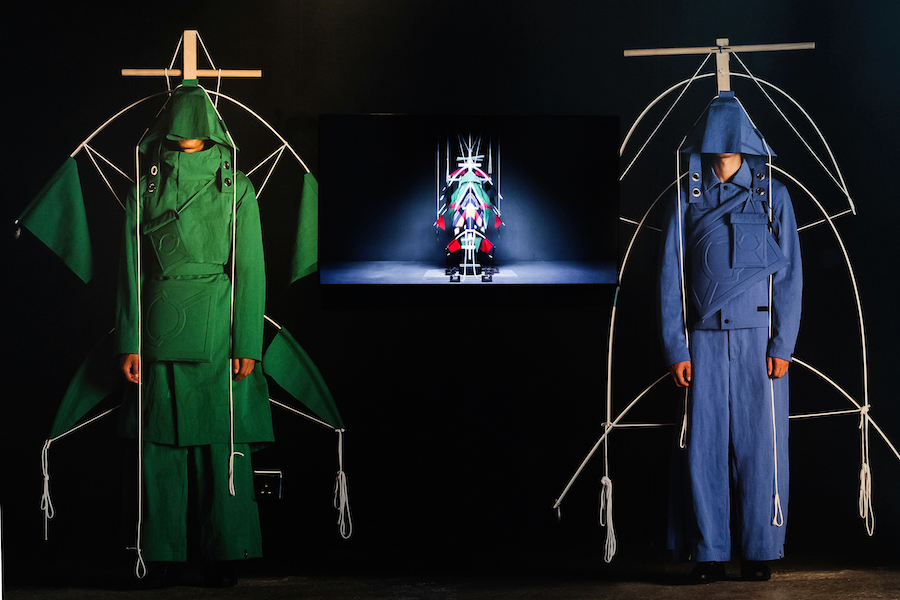DUBAI: While many industries have slowed over the course of the pandemic, the digital landscape in which we now live has accelerated.
The digital sphere, already fast-tracked before the pandemic through social media and other high-tech elements, is now the focus of our everyday existence. Our life now exists through screens. We work through screens, communicate through screens and connect with others through screens.
We also connect with ourselves through screens, and it is this idea of the self that a pivotal exhibition, “Age of You,” now open at the Jameel Arts Center, says is under threat as a consequence of our widespread digitalization.

Crowd Landscape, 2021, Satoshi Fujiwara. Courtesy of Jameel Arts Centre. Photo by Daniela Baptista
The exhibition, which runs at the Dubai center until Aug. 14, was curated by three of the art world’s most respected curators: Shumon Basar, Douglas Coupland and Hans Ulrich Obrist.
It is based around the trio’s latest book, “The Extreme Self,” a sequel to their previous title, “The Age of Earthquakes: A Guide to the Extreme Present.” The new book features “13 immersive chapters that chart the remaking of one’s interior world as the external world becomes increasingly uncertain.”
Basar told Arab News: “The world in many ways feels unrecognizable from a year ago when the pandemic began. ‘Age of You’ shows you how, and maybe why that’s the case.”
Set across two of Jameel Art Center’s gallery floors, the new exhibition includes graphic design by Daly & Lyon, and works by more than 70 international visual contributors from the worlds of art, design, filmmaking, photography, technology and electronic music.

Behold These Glorious Times!, 2017, Trevor Paglen. Courtesy of Jameel Arts Centre. Photo by Daniela Baptista
“Age of You” also includes new commissions that showcase various aspects of what the curators have termed “the extreme self,” including works by Yuri Pattison, Satoshi Fujiwara and Stephanie Saade, whose work deals with screens, crowds and “emoji-as-surveillance.”
There are also films by Trevor Paglen and NVIDIA Research, and audio “deepfakes” by Vocal Synthesis that are created through artificial intelligence. The works of Jenna Sutela, Sara Cwynar and Victoria Sin explore transforming perceptions of the face and the body, while Craig Green’s collection and campaign for Moncler marries menswear with a machine.
“It seems that ‘Age of You’ is one of very few large-scale museum exhibitions to open anywhere in the world this spring, and its subject matter could not be more timely,” Antonia Carver, Jameel Arts Center director, told Arab News.

Illocutionary Utterances, 2018, Victoria Sin. Courtesy of Jameel Arts Centre. Photo by Daniela Baptista
“The exhibition has been in development for a number of years, and its first iteration was at MOCA Toronto, with whom we collaborated on the show,” she added. “It addresses issues that are very ‘now’ — how technology is shaping us, how our data has become the global commodity of today and how our new ‘extreme selves’ are shaping our world.
“But through the pandemic, the exhibition became even more urgent and relevant to our age. The curators adapted the show over the past few months, and brought in further discussion of our online lives and our new understandings of the individual and the crowd.”
The works — a mix of emojis, films, bold statements and installations — relay feelings of happiness, sadness, depression and confusion. Among the highlights is Satoshi Fujiwara’s eight-meter-high, 22-meter-long photographic sculpture that has transformed one of the center’s inner gardens into a surreal skyscraper of faces.

Untitled (iOS emoji content aware fill), 2021, Yuri Pattison.Courtesy of Jameel Arts Centre. Photo by Daniela Baptista
There is also Jenna Sutela’s lava lamp heads, which, according to Basar, “remind us that humans are maybe the most alien life forms on earth.”
Another installation, a 10-meter-high outdoor banner, displays a new Russian doll emoji tagged with four words that reiterate our obsession with the self: “Me. You. It. Us.”
As the viewer walks through the exhibition, they feel the same electrifying and confused pulse that screens in everyday life emanate. “Age of You” emphasizes the obvious: This century’s most valuable resource is you — all of your online behaviors turn into the data and algorithms that dictate the movement of our digital sphere.
“‘Age of You’ addresses a global phenomenon, but as the first post-pandemic exhibition addressing this theme, it’s particularly apt that it is staged in the UAE, in the Gulf, and from here, beams out globally,” said Carver.

‘Age of You,’ Courtesy of Jameel Arts Centre. Photo by Daniela Baptista
“It’s well known that here we have a particular affinity with new technologies, high mobile phone usage, and an intense interest in artificial intelligence, and in debating and developing strategies for the future. This show has a dynamic, seductive theme and design, but it’s not an easy one — it challenges each and every one of us to interrogate our lives and our relationships with technology.”
A book on the exhibition is due for release later this spring. The book “will travel, which means the show will travel, too,” Basar said.
The exhibition leaves us with this question: What if the future is dictated by the unintended consequences of who you are and your online actions? Only time and our actions will tell.







0 التعليقات:
إرسال تعليق